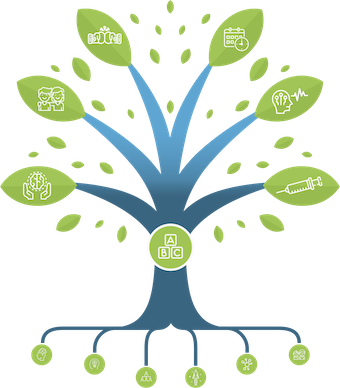Pregnancy and Migraine
** Pregnancy is a sensitive situation in medicine. Please discuss any question with your health care provider before making health decisions.
Migraine commonly occurs during a women’s reproductive years. Treating migraine during pregnancy can be challenging as the migraine pattern may change, and most importantly the medications used to treat the migraine have to be safe for the mother and her unborn baby. For physicians, pregnancy is also considered as a “red flag” in patients complaining of headaches. It is important to keep in mind to look for other causes of headaches during pregnancy before considering migraine.
What happens to my migraines if I get pregnant?
There are a lot of factors during the entire 9 months of pregnancy and even throughout the 6-weeks after pregnancy that can influence your headaches such as hormonal changes, stress, interrupted sleep, nausea and dehydration.
Several studies have shown that your migraine headaches may worsen in the first trimester, but luckily up to 60-70% improvement in your headaches can be seen by the 2nd and 3rd trimester.
Is it dangerous to have a migraine during my pregnancy?
No. You can have a migraine headache without danger to you or your unborn child. What has been seen is that pregnant migraineurs may be at increased risk of some conditions like pre-eclampsia, premature birth and low birthweight. This should be monitored by your family doctor or your obstetrician.
When should I be concerned about a headache during pregnancy?
In general, if you have any concerns about a headache during pregnancy, you should seek medical attention. However, here are a list of some headache symptoms that would make a doctor consider more urgent tests:
- Sudden severe headache that reaches a maximum intensity in less than 1 minute.
- New aura, prolonged auras or neurological symptoms with your headache.
- Any change to your typical migraine headache.
- Severe nausea and vomiting.
- Any loss of consciousness (passing out).
What treatments are safe to take if I do have a migraine when I am pregnant?

First line therapy: always start with the non-medical strategies if possible. Options you can consider include:
The next step would be to use over-the-counter pain medications that have been shown to be relatively safe in pregnancy. In the 1st trimester the following have been considered as relatively safe, although they may potentially cause rare side-effects involving the liver, heart rhythm and nerve problems:
Small doses of caffeine (doses below 300mg). See here for caffeine calculator
- Acetaminophen (i.e. Tylenol)
In general, a few anti-inflammatory medications have been considered relatively safe option only in the 2nd trimester, and should never be used in the 1st trimester due to risk of abnormal placental implantation and and 3rd trimester due to risk of premature closure of a hole in the heart of the unborn baby called ductus arteriosus.
Procedures such as nerve blocks using a numbing medicine called Lidocaine have been shown to be safe and effective to get rid of severe headaches during pregnancy. Acupuncture is also considered safe during pregnancy.
Triptans have been used by pregnant women in «real life», and registries looking at this situation do not suggest a significant risk for the baby. Sumatriptan is the one for which we have the most information. The use of triptans may increase the risk of hypertension during pregnancy and bleeding after. They should be avoided if possible, but if the woman has severe attacks that responds well to triptans, a decision to use sumatriptan could be made after a careful risk/benefit discussion with the physician.
***Please consult your family doctor to see if you are a candidate for these medications or procedure. Your family doctor may refer you to a pain specialist or headache specialist for the nerve blocks***
What about my migraine prevention medications? Can I continue these medications?
Majority of these medications will have to be stopped for months before planning for pregnancy or if you find out you are pregnant while taking them, do not take your next dose and contact your family doctor for advice.
In general, migraine headaches improve during the latter part of pregnancy, so it is possible you will not need your preventative medications during this time. There are available preventative medications that are relatively safe during pregnancy which you can discuss with your doctor.
Overall, it is better to be very cautious and try to avoid using medications for migraine treatment during pregnancy to avoid side effects for you and your unborn child.
If I improve during pregnancy, will the migraines come back after delivery?
Migraines will tend to come back around the 1 to 2-months after delivery. This is not universal and so they may come back earlier or later. There are many factors that will play a role in how fast your migraines will come back including breastfeeding, sleep patterns, stress, diet and hydration.
What will be the impact of breastfeeding on migraine?
Women with migraine who breastfeed tend to have less migraine headaches than those who do not. The theory is that the hormone prolactin released during breastfeeding prevents your periods from happening – basically preventing the estrogen levels from going up and down.
It is also important to follow-up with your doctor to advise you on what medications are safe to use during breastfeeding.
REFERENCES
1. Todd C, Lagman-Bartolome AM, Lay C. Women and Migraine: the Role of Hormones. Current neurology and neuroscience reports. 2018;18(7):42.
2. Robbins MS. Headache in Pregnancy. Continuum (Minneapolis, Minn). 2018;24(4, Headache):1092-107.
Post#505
Tags In
Categories
THE MIGRAINE TREE
- BRANCHES
- ACUTE TREATMENTS
- DEVICES AND NEUROMULATIOIN
- PREVENTIVE TREATMENTS
- PROCEDURES AND INJECTIONS
- SELF-CARE AND LIFESTYLE
- SOCIAL LIFE
- TRUNK
- ROOTS
OTHER CATEGORIES




